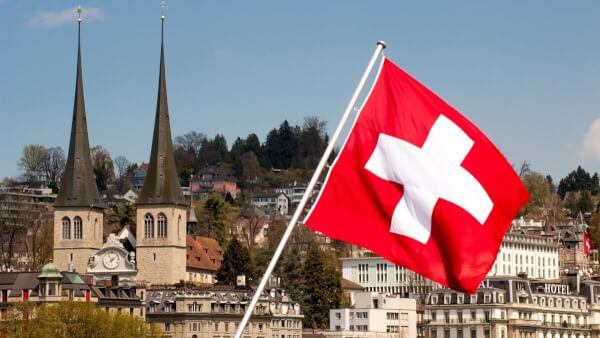Inheritance tax in Switzerland: What you need to know
Discover everything you need to know about inheritance tax in Switzerland. Our comprehensive guide covers the rates, who pays, how to calculate, and much more.

This beautiful land of lakes and mountains is also one of Europe’s richest countries. The quality of life is incredibly high - and matched by the size of the salaries. However the prosperous lifestyles of the Swiss come at a cost: Switzerland is not part of the European Union (or EEA), and the country can seem rather insular and monocultural compared to other Western European countries, even in the urban areas.
Although Switzerland is not part of the EU or EEA, it is part of the European Free Trade Association (EFTA) and the European Schengen Area. This means that EU citizens have the right to travel freely to Switzerland. EU citizens can also live and work there, but need to register to work and apply for a residence permit if staying longer than three months.
Switzerland is famously expensive. It has one of the highest costs of living of any country in the world and it is in the top three in Europe, along with Iceland and Norway. Check out the figure-crunching website Numbeo for some day to day cost of living details.
Sadly, the exciting anonymous Swiss bank accounts beloved of thriller novel writers are just that: Fictional. The reality is far more boring, and like the UK you will be required to prove your identity. Some banks also need to see a work contract in order to open a standard Swiss current account for you.
Also, be aware that things that are free in the UK such as current accounts and credit cards sometimes have a monthly or annual fee attached in Switzerland. Once you have opened your Swiss account, register with Wise in order to transfer money between your UK and Swiss accounts without having to pay hefty bank fees.
Good news: The unemployment rate in Switzerland is one of the lowest in the world, at around just 3%. Bad news: Non-Swiss residents make up 50% of that 3%. Swiss citizens tend to be highly educated and trained - competition for jobs is stiff. However, once you find work, the perks are excellent, with a minimum of four weeks holiday a year. The biggest employers of expats and English speakers are the multinational companies headquartered in Switzerland, which include Nestle, Zurich Insurance and Credit Suisse.
The international organisations based in Geneva, such as the United Nations, the World Trade Organisation and the International Red Cross also employ large numbers of expats. Speaking German in Zurich or French in Geneva will give you a huge advantage when applying for jobs, even in English-speaking workplaces. Upload your CV and search for jobs on EURES, the European job mobility portal.
Like their neighbours in Germany, Swiss people are more likely to rent their apartment than buy it, with around 60% of the population renting (and this figure increases dramatically in the cities). This means that the rental market is highly competitive and very difficult to break into. Couple this with some of the highest rents in the world (rents in Geneva are on a par with New York), and you can imagine what a nightmare getting a roof over your head can be.
It is standard to pay a three-month deposit on an apartment, and you will need to submit an application, proof that you have paid your rent on time previously and salary details when you are interested in an apartment. Unless you are very lucky you will be up against other apartment-hunters, so you need to show your potential landlord that you are the perfect tenant. Using an agency is one way to get around this - but they're likely to charge around two months rent for their services.
Swiss schools are, unsurprisingly, excellent. If you are taking your family with you to Switzerland, then school age children will generally be given a place at the school near to where you live. School hours are usually 8am to 12pm and then 2pm to 6pm, with Wednesday afternoons free for extra-curricular activity.
Switzerland has universal healthcare, with compulsory healthcare insurance. Residents are required to pay for basic health insurance (non-profit making for the insurer). It is required to be offered to everyone by the insurers, whatever their age or pre-existing medical conditions. For an adult of 26+, it costs approximately 400 CHF a month. Healthcare in Switzerland is at a very high standard, and medical staff will usually speak English if needed.
Before moving abroad, take a look at our handy time-sensitive checklist to remind yourself of everything you need to do to get organised.
*Please see terms of use and product availability for your region or visit Wise fees and pricing for the most up to date pricing and fee information.
This publication is provided for general information purposes and does not constitute legal, tax or other professional advice from Wise Payments Limited or its subsidiaries and its affiliates, and it is not intended as a substitute for obtaining advice from a financial advisor or any other professional.
We make no representations, warranties or guarantees, whether expressed or implied, that the content in the publication is accurate, complete or up to date.

Discover everything you need to know about inheritance tax in Switzerland. Our comprehensive guide covers the rates, who pays, how to calculate, and much more.

Find out everything you need to know about Switzerland RSU tax here in our essential guide, including current tax rates.

Read our helpful guide on how to transfer a UK pension to Switzerland, including the steps, fees and taxes involved.

The complete guide to buying property in Switzerland as a foreigner. Read about how to buy Swiss property, average prices, fees, and more.

Everything you need to know about moving to Switzerland from the UK. Read about visas, popular expat destinations, healthcare and more.

Switzerland offers many perks for anyone moving there from the UK. But, there are also some downsides to look out for. Read on to learn more about both sides.